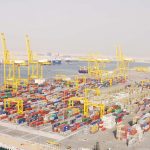The London-based Greek Shipping Co-operation Committee (GSCC) had some harsh comments about the recent COP 26 summit in Glasgow.
GSCC chairman Haralambos Fafalios said the “over-riding conclusion of COP 26 was governments salivating at the revenues they would collect from an assortment of green levies”.
In a statement to mark the new year, Fafalios said the summit did not produce a word about “coming up with any technological solutions whatsoever, or indeed guaranteeing the worldwide availability of safe, sustainable, low or zero carbon fuels”.
He said that should levies be introduced “it is imperative charterers shoulder the burden as they alone define the voyage of every ship vis-a-vis size of cargo, itinerary and transport speed and it is encouraging to note the EU is making noises in that direction”.
“In our industry various organisations and companies are touting their green credentials with the choice of fuels that will power their newbuildings. However, none of them are really carbon free and they just kick the can down the road,” said Fafalios.
“It must not be forgotten that world shipping has been swiftly and silently decarbonising for the last 70 years successfully, finding technological solutions in order to reduce the carrying cost and decrease the carbon footprint of each ton of cargo. No other industry globally has had such a successful result and done so in such a cost-effective manner,” said Fafalios.
He said LNG is an interim fuel but still carbon intensive. Green or e-methanol is currently unavailable worldwide in the quantities needed. Ammonia is quite dangerous to the crew if not properly contained and also produces nitrogen compounds far more pollutant than CO2. The major issue with all these is the significant amount of pilot fossil fuel required for their combustion. “Yet again, both engine and ship builders are only just now starting to address any technical solutions. These are still at an embryonic stage,” he said.
He said “no real effort has been made to invest the revenue derived from any carbon taxes into a R&D fund for the maritime sector. Such a R&D centre should be created and based in Greece, which is the global centre of the maritime industry.”
“Whilst the EU has been trying to hijack the debate on green taxes, cut off dates and other maritime issues, one should caution them that only the IMO has the knowledge and experience to come up with global, short, medium and long- term solutions. Criticising the IMO is the most counter-productive way to move forward,” said Fafalios.
Looking at the world economic situation, he said inflation yet again is rearing its head.
“The main issue of the year was and is all our crew members at sea and the superintendents that have to travel around the world visiting ships. The repatriation and vaccination issue is as difficult as ever and many countries, especially in Asia, are not helping to facilitate this issue,” he said, continuing “This in turn has naturally brought about many physical and mental health issues.”
He urged the Greek government to improve the maritime education system through concentrated investment and private sector involvement. “It must also be stressed the Greek flag itself, although broadly competitive at first glance, needs a significant reduction in bureaucracy if it is ever to flourish again,” said Fafalios.
From an international perspective, the GSCC continues to stress the need for longer serving individuals at both the IMO and the EU. “It remains disappointing that Greece does not have a more prominent voice in EU maritime affairs, considering that it represents over 50% of the EU fleet,” said Fafalios.
Source: Seatrade Maritime News






